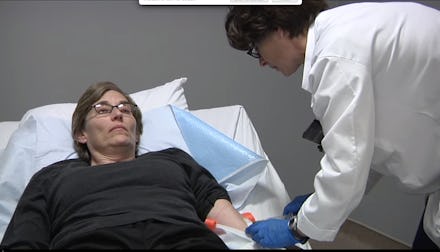Doctors Cured This Woman's Cancer — By Infecting Her With a Deadly Disease

The news: Every day, it seems like we get more exciting news about finding a cure for cancer — and this latest update is taking us one step closer to a breakthrough.
Back in May, the Mayo Clinic made the much-awaited announcement that a blood cancer patient treated with experimental virotherapy — in this case, the measles vaccine — had a positive reaction to the treatment. And on Monday, the clinic released an even more encouraging follow-up: The patient, Stacy Erholtz, has been completely cancer-free now for a year and the next phase of the clinical trial will start this month.
Scan of Erholtz's cancer-free body. Image Credit: YouTube
"I'm really excited about it, not for myself, but I want some multiple myeloma measles friends," Erholtz told Minnesota's Brainerd Dispatch. "I've had a dose, and you can't be redosed. It's time for other people to have a dose. It's a giant step forward for cancer. Let's get it out there. Let's put some money behind it and get it out there."
How it works: Erholtz had an aggressive form of multiple myeloma — a blood cancer that starts in the plasma cells of bone marrow — that spread throughout her entire body over the course of 10 years. Out of conventional treatment options, she decided to participate in the Mayo Clinic's experimental study. The researchers injected Erholtz with a hefty dose of the measles vaccine — enough to inoculate 10 million people. After a single dose, she was in complete remission.
Cancer cells binding with measles and exploding. Image Credit: YouTube
Previous research on mice has shown that intravenous viral therapy can overwhelm cancer cells and cause them to explode. Certain viruses — such as herpes and poxvirus — have been found to be effective; they "bind to tumors and use them as hosts to replicate their own genetic material; the cancer cells eventually explode and release the virus," explains the Star Tribune.
The measles vaccine will not work for all types of cancer; the other patient who participated in the study did not sustain the same results that Erholtz did. The efficacy of the treatment also depends on the patient's immune system. Most people have been inoculated for measles, but those with suppressed immune systems have a high chance of responding to an introduction of the virus. Erholtz, for instance, had limited previous exposure to measles and a weakened immune system.
Doctors also only have one chance to get the treatment right. Once the body recognizes the virus, it will attack it the second time before it has a chance to bond to the cancer cells. It's a matter of getting the dose right the first time around. Future research will focus on how to tailor the treatment for each patient.
Moving forward: While the treatment is far from perfected right now, it's still an exciting breakthrough for the hundreds of thousands of people who suffer from myeloma — which is expected to kill over 11,000 people this year — or other forms of cancer that might respond to this approach.
The Mayo Clinic reportedly has 15 doses of the measles treatment available for the upcoming trial; around 350 people are on the waiting list and the clinic is attempting to experiment on several more types of cancer, including brain, ovarian, neck and head cancers.
The clinic is also hoping to receive FDA approval for the treatment in the next four years; if it succeeds, this potentially game-changing discovery might be available to patients in the near future.